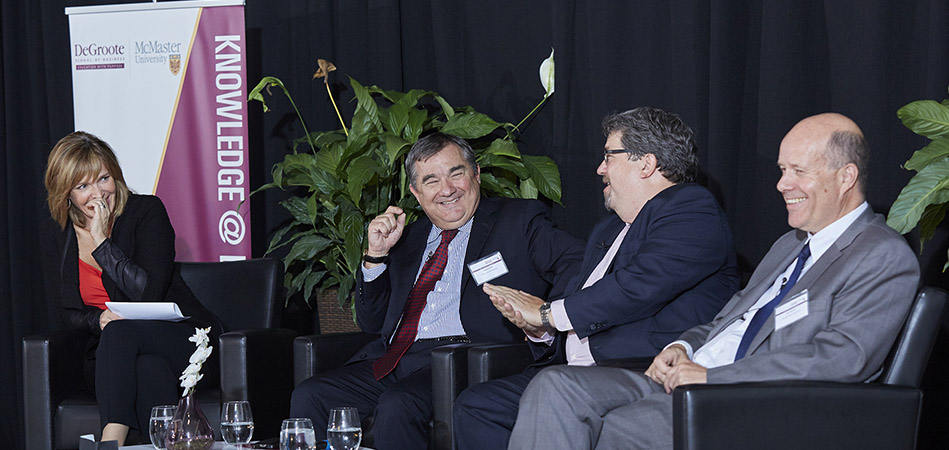New Media, New Business: Expert panel tackles evolving media landscape

In recent years, changes in digital communications have led to substantial shifts in both the media industry and traditional marketing and communications practices.
To help address rapid change, the DeGroote School of Business has emerged as a leader in managing digital disruption. The School now offers a suite of academic programs and events designed to address some of the most pressing concerns facing healthcare, finance, marketing, sports, and other industries.
On October 19 at Burlington’s Ron Joyce Centre, an expert panel addressed themes in media, marketing, and communications, as part of DeGroote’s New Media, New Business event. The evening affair was produced in partnership with the Master of Communications Management (MCM) program, Canada’s leading communications management graduate program.
The panel included Dianne Buckner, Host, Dragons’ Den, Business Correspondent, CBC News; David Estok, VP, Communications, University of Toronto; David Scholz, Managing Partner, Leger and ConsumerVision; and Paul Berton, Editor-in-Chief, The Hamilton Spectator.
Among other topics, the panel discussed how social media is changing the way people engage with the media and businesses; the growth of citizen journalism and blogging; how consumer expectations are shifting; and the challenges and opportunities of using modern media. They opened the session with a reality check for the audience about social media engagement.
“Most people would assume that the majority of Canadians are on social media,” said Scholz. “However, only 68 per cent of Canadians actually use social media as a result of various socio-economic factors such as location and personal resources.”
Still, that 68 per cent is making a big impact. Once the panelists settled in, the conversation shifted to its main focus: the effects of digital media on traditional business models.
“Whether it be in the newspaper business or any other industry, we can only count on further change happening,” offered Berton, who has been with the Spectator since 2010. “Change is so rapid that anybody’s grasp on success is temporary at best.”
Berton focused on the “panic” traditional print media is facing as a result of competition from social media users, bloggers, and citizen journalists. The newspaper industry in particular has been struggling to develop a successful business model that would provide a comparative advantage. Berton believes that if newspapers can maintain their brand while also taking the initiative to embrace digital change, they may still have a future.
“The growing realization now is that whoever breaks the story first decides what the angle is,” added Estok. “It is very difficult to change the minds of readers after the initial story has been launched.”
To that end, Estok explained how many companies and brands are now striving to connect with audiences directly via email, social media, targeted advertising, and other forms of digital engagement. If you control the story, you control the messaging.
In the university sector, for example, many media relations professionals have shied away from issuing traditional press releases in the hopes of earning good coverage. Now, they’re transitioning to a form of “brand journalism” – telling their own stories with well-crafted articles, photos, videos, and social media content, and packaging it for a targeted audience.
The overarching message from the panelists, based their research and experience, was that organizations must be prepared to embrace digital change to succeed. The panel also concluded that in today’s fast-paced world, readers and consumers are more likely to rely on emotions than fact-based stories. Buckner added that today’s consumers often trust social media more than family and friends.
The event was part of the popular Knowledge @ DeGroote series, which showcases research experts alongside industry leaders in conversation on important business topics. Recent themes have included big data and analytics, mental health, gender diversity on boards, and Canadian and global economic outlooks. Industry participants have included Mervyn King, former Governor of The Bank of England; Gino Scapillati, Vice Chair of PwC Canada; and Sherry Cooper, Chief Economist, Dominion Lending Centres.
Join Burlington’s top executive network for our next Knowledge @ DeGroote event on Friday, November 4. The lunchtime event, Inspired to Innovate: Lessons from the Art of Entrepreneurship, will focus on how leaders can make an impact by fostering a more entrepreneurial culture in their organization.

